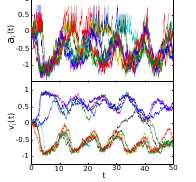Dilemmas of partial cooperation
Hans - Ulrich Stark
Evolution (2010)
Research: Reputation Trust Cooperation
Abstract
Related to the often applied cooperation models of social dilemmas, we deal with scenarios in which defection dominates cooperation, but an intermediate fraction of cooperators, that is, “partial cooperation,” would maximize the overall performance of a group of individuals. Of course, such a solution comes at the expense of cooperators that do not profit from the overall maximum. However, because there are mechanisms accounting for mutual benefits after repeated interactions or through evolutionary mechanisms, such situations can constitute “dilemmas” of partial cooperation. Among the 12 ordinally distinct, symmetrical 2 × 2 games, three (barely considered) variants are correspondents of such dilemmas. Whereas some previous studies investigated particular instances of such games, we here provide the unifying framework and concisely relate it to the broad literature on cooperation in social dilemmas. Complementing our argumentation, we study the evolution of partial cooperation by deriving the respective conditions under which coexistence of cooperators and defectors, that is, partial cooperation, can be a stable outcome of evolutionary dynamics in these scenarios. Finally, we discuss the relevance of such models for research on the large biodiversity and variation in cooperative efforts both in biological and social systems.

